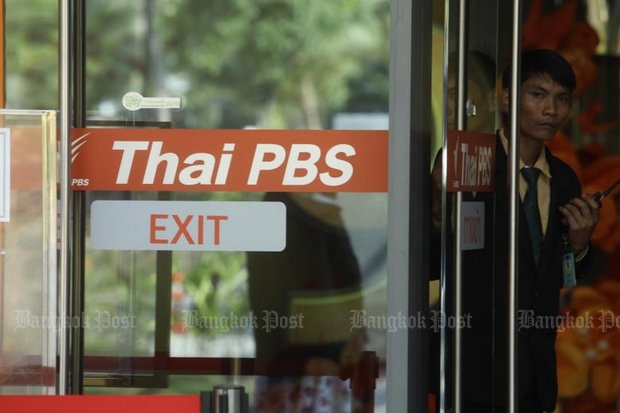
Prime Minister Prayut Chan-o-cha on Thursday slammed Thai PBS, the country's sole public TV station for its "one-sided" reporting despite it being financed by the state budget.
Speaking at a forum on public information disclosure, the prime minister said the channel only focuses on people suffering from the drought and other problems and not on what the government has done to solve these problems.
"Thai PBS is financed by the state budget. It needs to help to promote understanding among people. Don't be one-sided in your reporting, showing only drought areas and negative issues which allow people to scold the government," the prime minister said.
Gen Prayut also suggested that Thai series producers take inspiration from the South Koreans who produce the drama Descendants of the Sun which tells the story of an army captain sent on a peacekeeping mission, and which has an element of patriotism.
"The drama shows patriotism and sacrifices of the nation which make conflicting parties reconcile themselves," he said.
Thai PBS director Krissada Ruang-areerat Thursday declined to comment on the issue.
Responding to Gen Prayut's comments, Thepchai Yong, the former director of Thai PBS, said the government misunderstands that a public broadcaster which is financed through "sin taxes" -- taxes collected from alcohol and cigarette sales -- belongs to the state.
That was probably why Gen Prayut criticised Thai PBS for not attaching more importance to the state's attempts to communicate to the public, Mr Thepchai said.
He said the government should view the issue on a case-by-case basis. Criticism is welcome if news reports are unbalanced, but it was wrong to assume Thai PBS has given no attention to state agencies.
"I believe state agencies already have their own channels for communication with the public whereas the mainstream media still gives little room to the public. This is the reason for having Thai PBS because the people have no space to express opinions or push for their causes. Therefore, they [Thai PBS] have done what they should in giving more room to the public than other media outlets," Mr Thepchai said.
On the question of whether Thai PBS has spent its annual allocation of 2 billion baht in worthwhile ways, Mr Thepchai said the broadcaster's performance over recent years is proof it has fulfilled the missions set out by the law.
Thai PBS is also required to submit annual reports to parliament and the cabinet. This serves as a mechanism to scrutinise the broadcaster, he said.
"I don't want the country's leader to use some occasional phenomena on television screens to judge if Thai PBS does its job well," Mr Thepchai said.
While he urged the prime minister not to misunderstand the public broadcaster's role, Mr Thepchai also expressed concern that Gen Prayut's comments may send the wrong signal to other state agencies or groups with a negative opinion of Thai PBS.
"These days the country is not in a normal situation. Anything can happen to a public broadcaster like Thai PBS. I am concerned some people who are hostile towards Thai PBS may take it as permission for them to do something to restrict or devalue Thai PBS's role as a public broadcaster.
Asked to give suggestions on how to improve state-run media, Mr Thepchai said that while past and present governments have channels for communication with the public, the problem remains of how to make itself understood.
Those in power always get it wrong, believing that having a great deal of air time is the best way to communicate with the people, which is not necessarily the case, he said.
"Communicating with the public is an art. You may have one or two hours of time, but no one listens or watches you. This explains why Channel 11's ratings are low. Don't blame the channel's executives, because those in power have tried to use it as a mouthpiece and they don't care if it is newsworthy or benefits society," Mr Thepchai said.
He urged those involved in national reforms to understand the social context of the media, rather than come up with a knee-jerk reaction and view the media as a source of conflict and try to come up with rules to interfere.
He said the media's role is significant for the development of democracy, adding that media professionals must have freedom to report information and express opinions.
He also said it is better for the public to be made aware of their role in keeping the media in check, rather than allowing the state to enforce legal restrictions to control the media.
A Thai PBS senior executive who declined to be named asked the prime minister to watch a television programme called Baeng Nam Chai Pun Nam Jai Su Phai Laeng (Sharing water and kindness and fighting drought), which has been broadcast on Thai PBS for almost two weeks.
The programme should help the prime minister realise that Thai PBS has tried to do its bit to help support the state's efforts to combat drought.
"This programme involves all sectors -- the people's sector, the ฺBoard of Trade of Thailand and state agencies -- to campaign for a reduction in water usage of 30% in three months. It is a campaign to help the nation," the source said.
The source said if audiences regularly watch the programme they will see success stories in several provinces.
"We want the premier to watch it until the end. He will see for himself the show is well balanced and does not attack any particular individual," the source said.